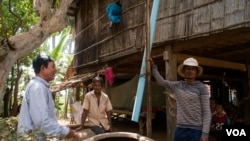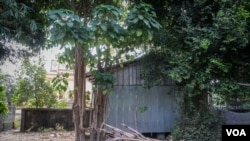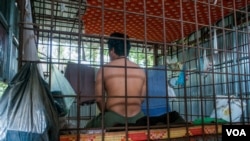For almost 10 years, former casino croupier Ly* has been locked up by his own family.
Ly’s life was turned upside down when, amid increasingly erratic behavior, residents of his village in Prey Veng province found him hanging from a palm tree by his legs. With little understanding of the mental health issues that had driven the once “normal” man to do such a thing, they and his relatives believed that restraining him was the best way of ensuring his safety.
Now 38, Ly could soon be free.
“Do you want to get out?” Dr. Ang Sody, clinic manager and senior psychiatrist at the Transcultural Psychosocial Organization (TPO), asked Ly on a recent visit to his home.
“It is up to you, doctor,” Ly replied, before whispering that he had found a “mythical path to Phnom Penh.”
Sody has been attempting to convince Ly’s family to free him, and is hopeful that this may happen within the year.
Ly’s father, Un Srun, 58, said he decided to chain his son up, and then lock him inside a small hut in a pagoda after a number of concerning episodes that included jumping out of a window in the middle of the night, and pulling an 80-year-old woman out of bed when she was asleep at her home.
Ly is believed to suffer from schizophrenia, a mental disorder characterized by disturbances in thought, perception and behavior.
For sufferers, the boundaries between imagination and reality can often become disrupted.
“I feel better, doctor. I am feeling more peaceful,” Ly told Sody, who has visited the home several times over the last six months.
Ly is one of 56 people suffering from mental health issues in Cambodia who have been reported locked up by TPO’s Operation Unchain project.
However, the real number of people in this situation is unknown.
Ly’s family has long considered the reasons behind their “smart” relative’s sudden change in behavior.
His aunt Kry Srim, 58, told VOA Khmer she believed financial difficulties led to the deterioration in his mental health.
While Srun Leng Sreang, Ly’s younger brother, said the lack of sleep endured by his sibling while working at the casino, possible drug use, and the rejection of a marriage proposal may all have been contributing factors.
But Sody of TPO said the causes of mental illness are “difficult to understand”, and has attempted instead to focus the family on efforts to help Ly’s recovery.
The family’s decision to lock Ly up was not an easy one.
“I used to buy a chain to lock him [with]. I locked it with tears rolling down,” Leng Sreang explained.
While Ly used to be well liked in the community, his erratic behavior caused rifts between the family and their neighbors.
Leng Sreang said the family, most of whom work in Phnom Penh, worried that if they didn’t lock Ly up the neighbors “would be angry and do something bad to him”.
“We have no better choice,” he said.
When Ly’s family made the tough decision to imprison him, they sought the advice of their local commune chief.
“I asked the commune chief for approval, and they (commune officials) helped us in the process too, when we built the cage,” said Leng Sreang, adding that the whole community took part in constructing Ly’s “cage”.
The hut that Ly lives in contains a small bed with a mosquito net, a toilet and a water tank for showers.
Every meal time, Ly’s aunt brings him food and medicine, which she says he always rejects. His father attempts to comfort him by talking through the walls.
A lack of knowledge about mental health issues and treatments in Cambodia means that people often don’t know where to turn for help.
Ly’s family took him to traditional healers in an effort to cure him before Leng Sreang found out about TPO on Facebook.
Cambodia has modeled its mental health system on a decentralized, community-based model that rejects institutionalization.
In practice, however, such community-based approach requires a network of mental health treatment and support services, which Cambodia currently lacks, said TPO Director Chhim Sotheara.
Officials at the Department for Mental Health and Substance Abuse could not be reached for comment.
In 2015, King Norodom Sihamoni donated $5,000 to TPO, allowing the NGO to initiate the Operation Unchain project, which focuses on helping people suffering from serious mental illness who have been locked up.
Sotheara said the project has now received almost $20,000 in donations, helping to reduce the burden on patients’ families who have long been in need of professional support.
While working on one case, he said the team often hear of another similar situation in a village nearby, while many more people are continuing to suffer in silence.
Ly’s brother urged the government and donors to do more to address the issue.
“It’s not just here. There are a lot more who are just like my brother, and I can find them in almost every village I have been to, even in Kampong Cham, our prime minister’s hometown,” he said.
*Not his real name










